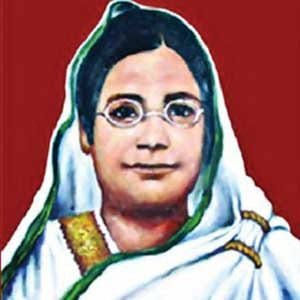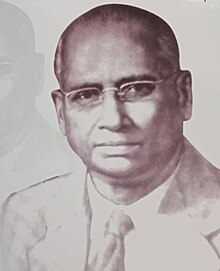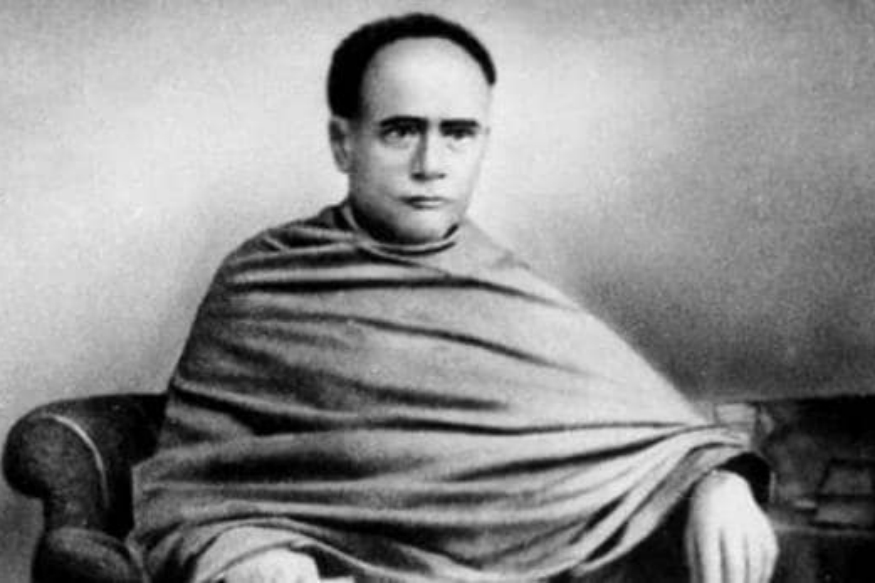The nineteenth century has been identified as the era of renaissance in Bengal and India. This was the beginning of a massive movement in the socio-cultural, political and economic spheres of the subjugated country.
A new India was born through the widespread spread of education, liberation of superstitions, development of social free thought, patriotism etc.
Begum Rokeya was one of the pioneers of social reform in the glorious history of renaissance India. She was the first to raise the demand for equality of women with men in the Bengali Muslim society, establish a strong doctrine in favor of women’s emancipation, and show the way to emancipation of women society by actively participating in the spread of women’s education.
Childhood and Education
Apart from a little primary education in childhood, no formal education was added to Rokeya’s destiny. He had the opportunity to stay in Calcutta with his mother once when he was five years old. It was here that his childhood education began with a meme teacher. But if Mem Sahib is a student, it is against the screen. With this argument, his studies stopped. Although the boys of the zamindar family of Payraband had all the opportunities and facilities to get an education, all avenues for girls to get an education were closed.
So Rokeya did not get any help from her father for her education. That is why he did not get the opportunity to study in any school.
Rokeya’s relatives not only encouraged him to get an education but also ridiculed him in various ways.
Rokeya’s two elder brothers were educated at St. Xavier’s College, Calcutta. Seeing the interest of the sisters, elder brother Ibrahim Saber and sister Karimunnesa also taught Rokeya in English. Inspired by Karimunnesa, Rokeya became interested in writing and practicing Bengali literature. One day in Rokeya’s childhood, Ibrahim Saber opened an English book with a big picture in front of Rokeya and said, “Sister, if you can learn this English language, the gates of one of the world’s gems will open for you.”
Literary Practice and Marital Life
Seeing Rokeya’s childhood and adolescence in this way, he entered youth. Rokeya was an outstanding beauty. His luck was favorable, Creator matched the suitable pot for him. In 1896, at the age of 16, Roque married a nobleman. Her husband’s name is Syed Shakhawat Hossain. He was a resident of Bhagalpur in Bihar. Her husband was a deputy magistrate, also a socially conscious, superstitious, liberal, and progressive thinker. He was equally proficient in Hindi and Urdu. He had a keen interest in the Bengali language. Among his close associates were Mazharul Anwar, an educationist from Hughli, and Mukundadev Mukherjee, son of Bhudev Mukherjee. Sakhawat himself was a supporter of women’s education.
By becoming the consort of this liberal liberal man, Rokeya found a favorable environment for his meditation. Through her own efforts and with the help of her husband, she got the opportunity to read various books, literature, and newspapers in English. She also gets the chance to gain extensive knowledge on child-rearing, pregnancy, economics, and philosophy of life as well as chemistry.
Rokeya was significantly useful in Sakhawat’s government affairs. Her Bihari husband was taught Bangla by Rokeya. Sakhawat lost his sight from some ailment just before he breathed his last. Since he became blind, it is his wife who has been seeing on his behalf. Towards the end of his life, Shakhawat suffered from diabetes and related complications. Shakhawat died on 3rd May 1909 while he was in Calcutta for medical treatment. His body was taken to Bhagalpur and buried there. With the death of her husband, all the family ties of the childless Rokeya were severed.
Rokeya’s married life lasted only ten years. When she was childless, she lost her husband prematurely and became a widow. After the death of her husband, it became impossible for her to stay at her father-in-law’s house in Bhagalpur. Rokeya was forced to move to Calcutta in 1910.
Establishment and management of schools
Rokeya, realizes that the prejudices, stigma, and degradation that have plagued the Muslim community for centuries can only be eradicated through the promotion of education. He realized in his heart the fact that the life of the then Muslim girls was dark and the society was in a state of decline due to lack of education. Throughout his life, Rokeya was able to realize that education is the backbone of the nation and without education, the nation cannot prosper. Half of the country’s population is women. Improving the nation by keeping this huge population in the darkness of illiteracy and ignorance is just a fantasy. It is not only the male community but also the female community that needs to be improved for the betterment of society.
Rokeya thinks that there are two essential parts of the same society – men and women. So both women and men need development. Realizing this fact, she sacrificed her life for the betterment of society by promoting education in the interest of the overall welfare of society.
In the last half of the nineteenth century, the Muslim community in Bengal did not take any significant steps toward the education of Muslim girls. No educational institution was built for traditional education at that time. The Muslims of that time were very reluctant to spread women’s education. The then British government also did not take any appropriate measures for the education of girls. In this adverse situation, some initiatives can be noticed for the expansion of women’s education in an isolated manner. The initiative was taken by the Christian missionaries to spread education among the girls of Bengal as a whole. Muslim girls, though in very small numbers, participated in it. The efforts of Christian missionaries for general education are to be commended.
Towards the end of the nineteenth century, some Muslim ladies’ wives came forward to spread education. The Comilla Girls’ School, founded by Nawab Faizannesa Chowdhurani in 1873, played an important role in the spread of women’s education. The Muslim Girls’ School was built in Calcutta in 1897 with the patronage and financial support of Begum Shamsi Ferdous Mahal, wife of the Nawab of Murshidabad. The school was inaugurated by Lady McKenzie, the youngest wife at the time. In 1909, Khujista Akhtar Banu, the mother of the famous Bengali Muslim leader Hussain Suhrawardy, established a Muslim girls’ school in Calcutta. This school is known as ‘Suhrawardira Balika Vidyalaya’.
Rokeya realizes that lack of education is the main reason for the decline and degradation of women. So in order to awaken awareness and self-esteem in the minds of women, she felt the need to establish schools for girls.
The journey of Shakhawat Memorial Girls School established by Rokeya started with only eight students and two benches. In his desperate efforts, some talented people from Kolkata, Mr. Barrister. Gathered at Abdur Rasool’s house. On 2 April 1911, a steering committee was formed with Maulvi Syed Ahmed Ali as its secretary. Welcoming the establishment of Rokeya School in the heart of Kolkata, The Muslim Magazine writes very seriously: We are glad to announce that Mrs. Sakhawat Hossain has already translated her proposal of starting a girls school into action and that the school was acutally opened on the 16th of this month… Her pupils are expected not only to become literate but good women too. We trust the Mohammedan Public in Calcutta will not lose such an opportunity of educating and teaching their daughters and sisters.
Rokeya wanted to educate Muslim women through the establishment of her school in such a way that they could be good daughters, good wives, and good mothers with high ideals. He comments, “Our girls should not only obtain University degrees, but must be ideal daughters, wives and mothers- or I must say obedient daughters, loving sisters, dutiful wives and instructive mothers.
In order to make this ideal work, she arranged in her school to teach all the essential subjects of girls starting from Korban lessons to Bengali, English, Urdu, Persian, fast aid, homing, cooking, sewing, etc. The school’s stated goal is stated in The Muslim, “Aim of the School- preparation for future citizenship & motherhood through an all round physical, mental & normal thaining.” Lady Jackson comments on Rokeya’s school education system: The girls here are not merely given an education of a scholastic type, but are given religious instruction an practical training which will fill them to be good housewives and capable mothers and families.”
Kolkata Judge Amin Mohammad and a non-Bengali GM. Kasemi also sincerely assisted in the development of the school. Prominent women like Begum Sultan Jahan of Bhopal, Mrs. PK Roy, Mrs. Hakam, and Mrs. Sakini Chowdhury also came and stood by Rokeya. On September 16, 1916, Sarojini Naidu wrote a long letter, expressing her sincere respect and best wishes for Rokeya’s selfless social service and extraordinary education. “Will you allow a strange like me to write and tell you from my sickbed how greatly I have sympathised with your brave work for several years, how deeply years I have admired your self- sacrifice and devotion in not only founding but so ably sustaining your work of education for Muslim girls.”
The Presidency and the school inspector of the Burdwan region, Miss. S, Bose said in his speech: “It (Sakhawat Memorial Girls School ) was started in a very small house of Waliullah Lane with only 8 girls on the rolls. When I first visited it, it could hardly be called a school, but now I am glad to notice the gradual development and rapid progress it had made in the course of only six years.”
Shakhawat Memorial Girls’ School was transformed into a high school for girls during her lifetime as a result of Rokeya’s immense dedication and pursuit over a long period of time. The school played a vital role in the education of Muslim girls. The school was reported in the June 11, 1932 issue of The Muslim, “ A first rate school teaching upto Matriculation standard. Excellent result 75% passes in the Matriculation – Top list in the Government Scholarship Exams. Staff-Graduates, Trained and Well-experienced teachers only.”
Rokeya has led the Shakhawat Memorial Girls’ School through personal grief, ridicule-criticism, insults-threats and various other obstacles. This was the motto of his life that every unfortunate woman in the country would be drawn to the path of knowledge.
Until the last day of his life, no obstacle could distract him from his determination even for a moment. He did not forget about his school even in the midst of hundreds of sorrows. He seemed to welcome the sadness. English poet Shelley “Our Sweetest Songs are those that tell of saddest thought” – This line seemed to be the key to his survival. The goal of building an ideal society in the future has inspired Rokeya with her hard work and relentless efforts. He knew that the pioneer of the women’s world could not stop. So he doesn’t have to rest. Because he has a long way to go:
…I have promises to keep
miles to go before I sleep
miles to go before I sleep.(Robert Frost)
The students of Sakhawat Memorial School have kept that glory intact till today. Rokeya also remembered the production aspect of children’s education. A Kindergarten branch was also started in this school on his initiative.
Social Welfare Work
Rokeya was also aware that older women in rural and urban areas should not be deprived of the light of education. For this purpose in 1916, she established ‘Anjumane Khawatine Islam’ or Nikhil Banga Muslim Mahila Samiti in Calcutta. It is also known as Calcutta Mohammedan Ladies Association.
Rokeya was also associated with the organization for various social welfare initiatives and needless to say, he also played a prominent role in those areas. Inspired and encouraged by him, various eminent persons of the society used to come forward in the work of social reform.
Rokeya has been associated with various social welfare organizations and has worked for the betterment of women’s society. The annual conference of the Muslim Women’s Association was held in Aligarh in 1925. Rokeya spoke at the conference. She was also a member of the Bengal Women’s Educational Conference.
Begum Rokeya’s contributions to Bengali literature and her advocacy for women’s rights continue to inspire generations. She challenged social norms and fought for equality at a time when such ideas were radical. Her legacy remains an integral part of the feminist movement in Bengal and beyond.
Death
Rokeya’s body gradually breaks down due to continuous hard work. His body tends to get worse or worse with various diseases. Even after this, he was a relentless worker in his work.
Begum Rokeya passed away on December 9, 1932, but her ideas and influence endure.




The very next time I read a blog, Hopefully it doesnt disappoint me as much as this particular one. After all, I know it was my choice to read through, but I really thought youd have something helpful to talk about. All I hear is a bunch of complaining about something you can fix if you were not too busy seeking attention.
I must thank you for the efforts youve put in writing this site. I really hope to check out the same high-grade content from you in the future as well. In fact, your creative writing abilities has inspired me to get my very own site now 😉
Excellent write-up
great article
I have learn a few just right stuff here. Definitely price bookmarking for revisiting. I surprise how a lot attempt you set to create this sort of fantastic informative web site.
I have been exploring for a little for any high quality articles or weblog posts in this sort of space . Exploring in Yahoo I at last stumbled upon this web site. Studying this information So i am happy to exhibit that I’ve an incredibly good uncanny feeling I came upon exactly what I needed. I such a lot undoubtedly will make certain to don?¦t omit this web site and give it a glance regularly.
Great post. I was checking continuously this blog and I’m impressed! Very useful information particularly the last part 🙂 I care for such info much. I was seeking this certain information for a long time. Thank you and best of luck.
I simply couldn’t go away your website before suggesting that I extremely loved the standard information a person supply in your visitors? Is going to be again ceaselessly in order to check out new posts.
I’m not sure where you’re getting your info, but great topic. I needs to spend some time learning more or understanding more. Thanks for excellent info I was looking for this information for my mission.
Just wish to say your article is as astonishing. The clarity in your post is just spectacular and i could assume you’re an expert on this subject. Well with your permission allow me to grab your feed to keep updated with forthcoming post. Thanks a million and please continue the gratifying work.
Some truly nice and useful information on this website, too I think the pattern contains superb features.
I believe other website proprietors should take this internet site as an model, very clean and good user pleasant style.
This website is amazing, with a clean design and easy navigation.
I’m really impressed by the speed and responsiveness.
The content is well-organized and highly informative.
This website is amazing, with a clean design and easy navigation.